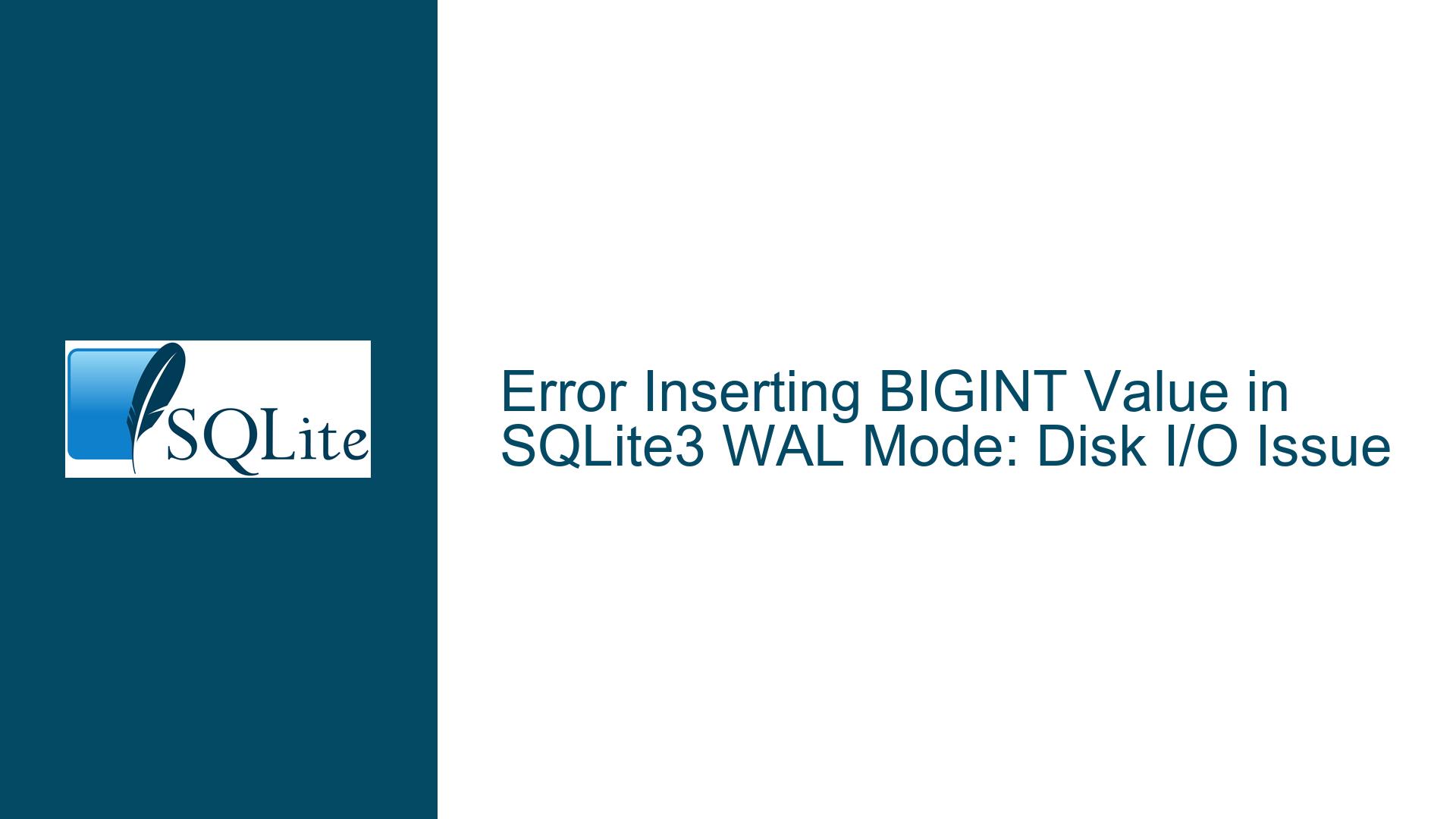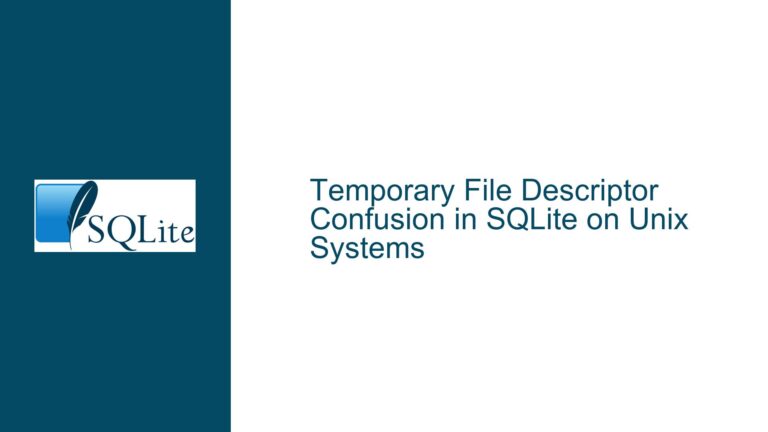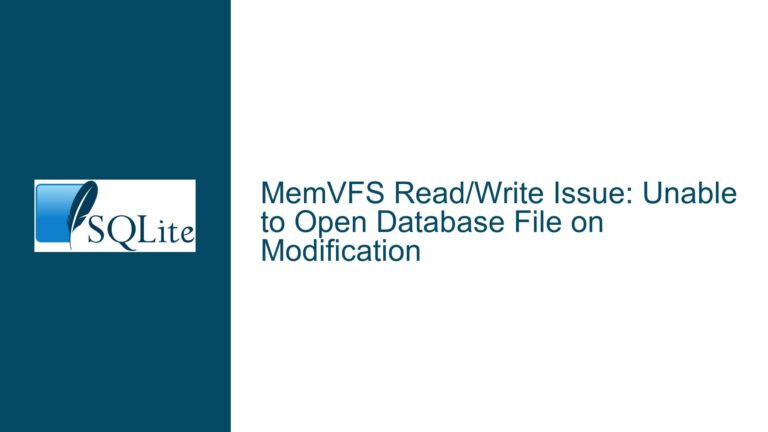Error Inserting BIGINT Value in SQLite3 WAL Mode: Disk I/O Issue
Issue Overview: Disk I/O Error When Inserting BIGINT with sqlite3_bind_int64 in WAL Mode
The core issue revolves around a disk I/O error occurring when attempting to insert a specific BIGINT value, 2147499852, into an SQLite3 database operating in Write-Ahead Logging (WAL) mode. The error manifests specifically when using the sqlite3_bind_int64 function to bind the value to a prepared statement for insertion. Interestingly, the issue does not occur when the same value is inserted using a direct SQL INSERT INTO statement. Additionally, the problem is inconsistent: it only arises when the table contains a single column. If the table has multiple columns (e.g., 10+), the insertion succeeds without error.
The issue appears to be tied to the interaction between the sqlite3_bind_int64 function, the WAL mode, and the table schema. The error message "disk I/O error" suggests a low-level issue, possibly related to how SQLite handles large integers in WAL mode under specific conditions. The problem persists even in SQLite version 3.45, indicating that it may be an edge case or a nuanced bug in the SQLite implementation.
Possible Causes: Schema Design, WAL Mode, and Binding Mechanism
The issue likely stems from a combination of factors, including the table schema, the WAL mode configuration, and the way sqlite3_bind_int64 interacts with SQLite’s internal mechanisms. Below are the most plausible causes:
Single-Column Table Schema: The problem only occurs when the table has a single column. This suggests that SQLite’s handling of single-column tables in WAL mode may differ from multi-column tables, particularly when binding large integers. The single-column schema might trigger a specific code path in SQLite that is not fully optimized or tested for large integer values.
WAL Mode and Large Integer Handling: WAL mode introduces additional complexity to SQLite’s transaction and write mechanisms. The error could be related to how WAL mode processes large integers during binding and insertion. For instance, WAL mode might require additional steps to ensure atomicity and durability, which could conflict with the way
sqlite3_bind_int64prepares the data for insertion.Binding Mechanism and Data Type Mismatch: The
sqlite3_bind_int64function is designed to bind 64-bit integer values to prepared statements. However, the error suggests a potential mismatch or corruption during the binding process. This could be due to an internal conversion issue, where the bound value is not correctly interpreted or stored in WAL mode.File System or Disk-Level Issues: The "disk I/O error" message indicates that the problem might extend beyond SQLite’s internal logic. It could be related to how the file system or disk handles the data being written. For example, certain file systems might have limitations or bugs when dealing with large integers or specific write patterns in WAL mode.
SQLite Version-Specific Bug: Although the issue persists in SQLite 3.45, it might be a version-specific bug that has not yet been identified or fixed. The problem could be related to changes in SQLite’s handling of large integers or WAL mode in recent versions.
Troubleshooting Steps, Solutions & Fixes: Resolving the BIGINT Insertion Error in WAL Mode
To address the issue, follow these detailed troubleshooting steps and potential solutions:
Verify the Table Schema: Ensure that the table schema is correctly defined and compatible with the data being inserted. For example, if the table has a single column, consider adding a dummy column to see if the issue persists. This can help determine if the problem is specific to single-column tables.
CREATE TABLE WRITE_SQLITE_TEST ( fileID BIGINT PRIMARY KEY NOT NULL, dummyColumn TEXT DEFAULT '' );Test Without WAL Mode: Temporarily disable WAL mode to see if the issue is related to WAL-specific behavior. Use the following command to switch to the default rollback journal mode:
PRAGMA journal_mode=DELETE;If the insertion succeeds in this mode, the issue is likely related to WAL mode. This narrows down the problem and provides a workaround.
Check for Data Type Mismatches: Ensure that the data type of the column matches the type of the value being inserted. For example, confirm that the
fileIDcolumn is defined asBIGINTorINTEGERand not as another type that might cause a mismatch.Update SQLite Version: Although the issue persists in SQLite 3.45, ensure that you are using the latest stable version of SQLite. Newer versions may include fixes or improvements related to WAL mode or large integer handling.
Review File System and Disk Configuration: Check the file system and disk for potential issues. Ensure that the disk has sufficient space and is not experiencing hardware errors. Additionally, test the insertion on a different file system or disk to rule out file system-specific issues.
Use Direct SQL Insertion: If the issue only occurs with
sqlite3_bind_int64, consider using a direct SQLINSERT INTOstatement as a workaround. This approach bypasses the binding mechanism and might avoid the error.INSERT INTO WRITE_SQLITE_TEST (fileID) VALUES (2147499852);Debug the Binding Process: Add debug statements to your code to inspect the values being passed to
sqlite3_bind_int64. Ensure that the value is correctly formatted and within the valid range for a 64-bit integer.sqlite3_int64 file_id = 2147499852; std::cout << "Binding value: " << file_id << std::endl; sqlite3_bind_int64(pInsertStmt, 1, file_id);Test with a Minimal Example: Create a minimal reproducible example that isolates the issue. This can help identify whether the problem is specific to your code or a broader issue with SQLite.
#include <sqlite3.h> #include <iostream> int main() { sqlite3* db; sqlite3_open(":memory:", &db); sqlite3_exec(db, "CREATE TABLE test (id BIGINT PRIMARY KEY);", NULL, NULL, NULL); sqlite3_stmt* stmt; sqlite3_prepare_v2(db, "INSERT INTO test (id) VALUES (?);", -1, &stmt, NULL); sqlite3_bind_int64(stmt, 1, 2147499852); int ret = sqlite3_step(stmt); if (ret != SQLITE_DONE) { std::cerr << "Error: " << sqlite3_errmsg(db) << std::endl; } sqlite3_finalize(stmt); sqlite3_close(db); return 0; }Consult SQLite Documentation and Community: Review the SQLite documentation for any known issues or limitations related to WAL mode and large integers. Additionally, seek advice from the SQLite community or forums, as other developers may have encountered and resolved similar issues.
Consider Alternative Databases: If the issue cannot be resolved and is critical to your application, consider using an alternative lightweight database that better supports your use case. For example, PostgreSQL or MySQL might offer more robust handling of large integers and complex transactions.
By systematically addressing each potential cause and testing the suggested solutions, you can identify and resolve the issue with inserting BIGINT values in SQLite3 WAL mode. If the problem persists, it may be necessary to file a bug report with the SQLite development team, providing a detailed description and reproducible example to aid in debugging and resolution.






